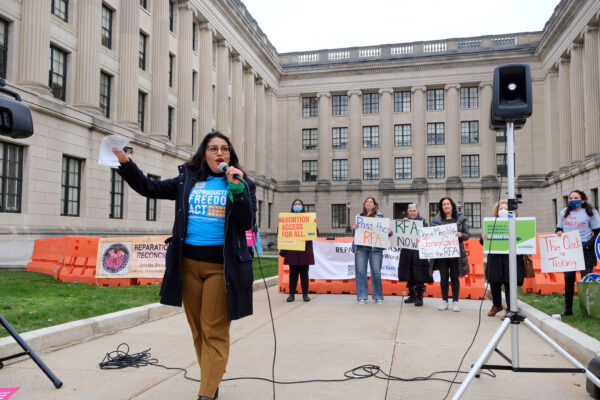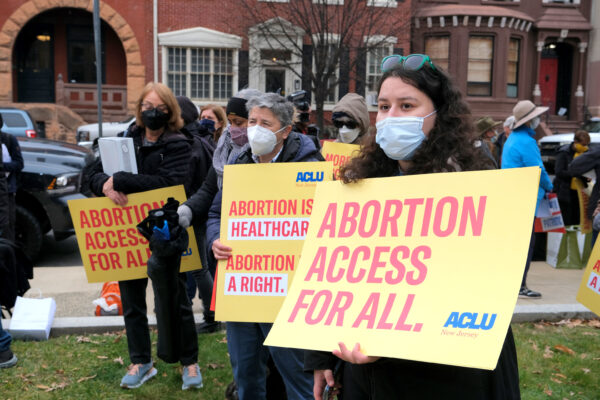I first saw the parallel realities of abortion access growing up in El Salvador, one of only three countries to restrict and criminalize abortion in all instances. For those who were wealthy and had access to resources, seeking an abortion was difficult, but not impossible. The true targets of these laws were, and continue to be, the people already facing the disproportionate impact of harmful socio-economic policies. A ruling in early December by the Inter-American Court of Human Rights deemed that El Salvador’s criminalization of abortion directly creates discrimination and gender violence, which disproportionally harms women in vulnerable situations.
In El Salvador and throughout the world, it’s the poor, the indigenous, and the marginalized for whom abortion is truly out of reach and criminalized.
While the reality of the laws in the U.S. might be significantly different, the parallels -- in terms of who is most impacted by bans, restrictions, and barriers to abortion access -- is clear. That is the reality across the United States, and New Jersey has similar divides.
While strong case law has determined that we in New Jersey have the right to an abortion, the reality is that right continues to be mostly accessible for those who have the money, time, and resources to access it. And as we know, when our rights are under attack, it is those communities that are most vulnerable – Black and brown communities, immigrants, low-income, and LGBTQ+, to name a few – with the most at stake.
A bill in our state Legislature, the Reproductive Freedom Act, can confront some of the inequities that push abortion services out of reach – but only if it keeps the focus where it belongs: on racial, social, and economic justice. (You can take action here to get it passed.)
The RFA, introduced by Senator Loretta Weinberg and Assemblywoman Valerie Vainieri Huttle, does several things. It declares our right to reproductive autonomy – which includes the right to contraception, the right to abortion and the right to carry a pregnancy to term – into law. With that declaration, the Reproductive Freedom Act recognizes that individuals must be able to make decisions about their own reproductive health without discrimination, barriers, or political interference.
Most importantly, the Reproductive Freedom Act at its core ensures that all people who can become pregnant not only have the right, but equitable access, to abortion care by guaranteeing it regardless of one’s insurance or immigration status.
Yet as important as it is to declare the right to abortion, a rights declaration alone doesn’t significantly change the status quo for our most vulnerable community members.
While the right to abortion is threatened around the country, the most urgent crisis for New Jersey is lack of access. High costs, limited access to providers, discrimination, and countless other obstacles currently prevent people from getting the care they are entitled to under the law. That’s why the RFA can’t stop at simply declaring the right to abortion in New Jersey. It must expand access to care.
The Reproductive Freedom Act includes sections requiring insurance policies to cover abortion with no out-of-pocket costs, and to guarantee affordable access for immigrants who don’t qualify for insurance coverage. For something as important as personal autonomy and undertaking the physical toll of pregnancy, cost should never be a barrier.
In a 2021 poll, 87 percent of New Jersey residents said pregnant people should be the ones who make decisions about abortion, not politicians. It’s past time for New Jersey to affirm autonomy, racial and economic justice, and the health of our communities and ensure that reproductive health care is accessible for all who need it.
All New Jerseyans – including cisgender women, transgender men, and non-binary people – have a fundamental right to reproductive health and to make their own health care decisions without political interference or the fear of financial strain or debt. Passing the RFA is a first step toward making that vision a reality.
The attacks on reproductive freedom in state legislatures and the cases before the Supreme Court make it more urgent for New Jersey to unequivocally affirm our right to reproductive health care, including abortion, and to ensure that anyone who needs care can receive it.
In the past three years, 12 bills have been enacted around the country to protect and expand access to abortion care. By making the RFA law, New Jersey can join these states in leading the way toward protecting and expanding reproductive freedom.
New Jerseyans have the power to demand that abortion be accessible for everyone, regardless of race, ethnicity, income, gender identity, or immigration status.
New Jersey has the opportunity to prioritize equity and justice.
New Jersey has the duty to acknowledge that rights without access is not enough, and we have the obligation to do something about it.
The time is now. Urge your legislators to pass New Jersey’s Reproductive Freedom Act.
Originally published on December 17, 2021, Alejandra Sorto https://www.publicsq.org/opinion/a-right-to-abortion-isnt-enough-there-needs-to-be-access




